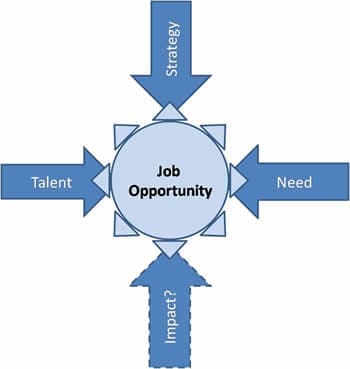Once a strategy has been designed, someone needs to implement it. And perhaps, like architects, we at FSG hope that our blueprint is implemented with fidelity by the engineering team that will carry the plan forward. However, in some cases, as with my own current client, a team may not be in place. Once a corporate social responsibility (CSR) strategy has been developed, what kind of talent should a company look for?
This month, I have also been invited to speak to a class of MBA students about careers in CSR. Here’s an engaged group – They want to have a meaningful impact on the world; one or two may have even worked in a CSR function before business school. They want to learn about post-MBA jobs and how to apply CSR skills in non-CSR jobs. The trouble is that the CSR career path is still being charted. Where will this talent go?
What kind of talent should companies look for?
FSG is currently working with a client to help them determine their new CSR team, starting with the new head. Below are a few of the characteristics that my team believes are vital.
- A Networker. Someone who can take a highly matrixed organization and gather the right group of people to share knowledge and collaborate to solve a common (social) problem. This team member will be the glue, who will build bridges across offices, departments and markets. An avid social media user would be nice too.
- An Educator. It’s a new strategy; the team needs to be able to sell new ideas inside the company and to external stakeholders. Whether setting up an employee matching gifts program or transforming the company’s R&D unit to align with solving social problems, it’s their job to teach their colleagues about why this CSR strategy is important for this company.
- An Entrepreneur. Someone should be scrappy, disruptive and flexible — able to “build the plane while flying it.” S/he should communicate a sense of urgency about delivering results to the business and to the public; it wouldn’t hurt if they could give a pitch presentation in front of a group of VIPs either.
- An Analyst. This person should be hungry for data in a field generally not known for it. We’re not talking about reporting on sustainability indices, but using tangible data related to the strategy to help the team know what’s working and what they should do to improve.
While there are other characteristics, these hit the top of our list.
Where will new talent go?
When I walk into that MBA classroom, I’ll share these “must have” characteristics with the 30 or so students/job seekers, but the truth is that opportunities are few and far between. At FSG, we often run into CSR practitioners inside of major companies who are “homegrown” folks who have fallen into CSR accidentally and who, once they have their CSR job, don’t leave. Much like the field of private philanthropy, job turnover is very low. And, even if, as our client illustrates, the market may be expanding as more companies prioritize resources toward CSR, many talented candidates will be left without the coveted CSR job.
Until the field catches up, I’ll tell the MBAs that there are other options to consider.
- Work for a values-driven social enterprise and seek out ways to create shared value
- Learn about the other side of corporate-stakeholder relations by managing corporate relations for an NGO, nonprofit or government agency
- Start in a related, non-CSR role, e.g., public and government affairs, marketing and communications, or supply chain management, inside a company and become one of those “homegrown” CSR professionals
- Consult to companies to help them solve their CSR needs, e.g., strategy, measurement or evaluation, reporting and communications, stakeholder engagement
Ultimately, if any of us are going to have an impact on business and society, we will have to be the networker/educator/entrepreneur/analyst that helps to change the status quo and do things differently.
I encourage you to share your perspective on these questions. If you’re a CSR manager or employer, tell us about other “must have” characteristics for effective CSR talent. If you have been seeking a CSR role yourself, or if you work in a related field, share ideas for where talent should focus their careers to increase shared value.

